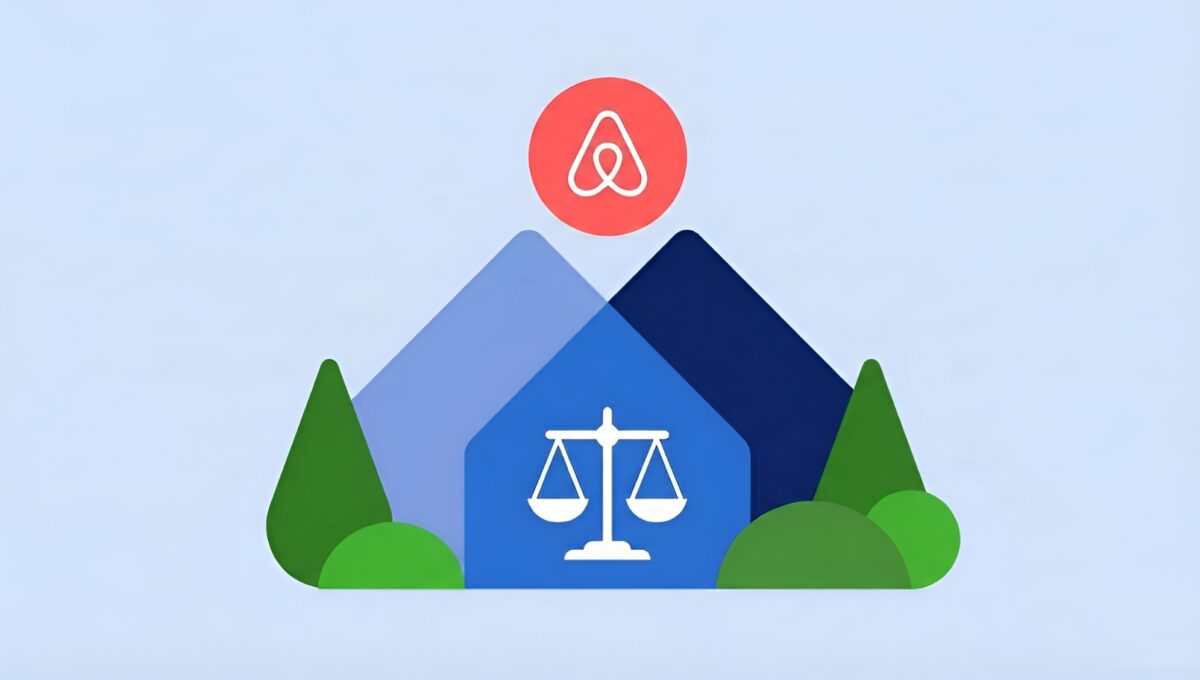
No More Doubt: Quick UK Airbnb Legal Requirements
Renting out your space on Airbnb is a fantastic way to earn extra income and meet new people. But as hosting has become more popular, so have the rules.
This guide consolidates all key legal requirements into a single location. It's designed to be comprehensive, covering what you need to know without the dense legal jargon. Understanding these rules is crucial to running a successful, stress-free hosting business and avoiding severe penalties.
The High-Stakes Basics: Why You Must Comply
Failing to follow the rules can be more expensive than the value of any booking. The potential consequences are severe:
- Unlimited Fines: Local councils can issue unlimited fines for breaching planning permission rules.
- Thousands in Penalties: In regions like Scotland, operating without a required licence can lead to fines of £2,500 or more.
- Legal Action: Your mortgage lender (if you have one) or your freeholder (if you're a leaseholder) can take legal action, which could result in the worst-case scenario of losing your home.
- Invalidated Insurance: If an accident happens (like a fire or a guest injury) and you haven't followed the rules, your standard home insurance will almost certainly be invalid, leaving you to pay for everything.
Think of these rules as your framework for being a professional, reputable host. A compliant property is a safe one, which leads to better guest reviews and a more sustainable business.
Is Hosting on Airbnb a "Business"?
Yes. Even if it's just a side hustle, in the eyes of UK law (specifically HMRC, the tax office), you are running a small business.
This means you must declare your earnings and pay tax on them. Since January 2024, digital platforms like Airbnb have been required to automatically report host earnings directly to HMRC, making this mandatory.
Your First Legal Checks: Before You List Anything
Before you even think about guest towels or welcome baskets, you must clear these two hurdles. Ignoring them is the quickest way to get into legal trouble.
1. Check Your Mortgage Agreement
Most standard residential mortgages explicitly forbid short-term letting. You must read your mortgage terms and, in most cases, get written permission from your lender. Failing to do so is a breach of your contract, and your lender could demand you repay the entire mortgage immediately.
2. Check Your Lease (If You're a Leaseholder)
Suppose you own a flat or a leasehold property (where you pay ground rent or service charges). In that case, your lease agreement almost certainly contains a covenant that restricts or outright prohibits subletting, which includes short-term rentals. You must get written consent from your freeholder (the building's owner or management company).
A Host's Top Priority: Guest Safety Standards
Regardless of where you are in the UK, you have a "duty of care" to your guests. In simple terms, you are legally responsible for ensuring your property is reasonably safe and that any hazards do not harm guests (and their belongings).
These safety requirements are non-negotiable.
1. Fire Safety
You must do a Fire Risk Assessment for your property. This is a legal requirement. You can find government guides on how to do this yourself.
Your assessment will almost certainly require you to:
- Install Smoke Alarms: At least one working smoke alarm on every floor of your property.
- Install Carbon Monoxide (CO) Alarms: You must have a CO alarm in any room that contains a fuel-burning appliance. This includes boilers, gas hobs, gas fires, and wood-burning stoves.
- Ensure Clear Escape Routes: All hallways, doors, and walkways that lead outside must be kept clear of obstructions.
- Provide Fire-Fighting Equipment: It is best practice (and required in some areas) to provide a fire extinguisher and a fire blanket in the kitchen.
- Check Furniture: Ensure all upholstered furniture (such as sofas and armchairs) has the fire-resistant "match" label, which has been required since 1988.
2. Gas Safety
If your property has any gas appliances (a gas boiler, gas hob, gas fire, etc.), you are legally required to:
- Get an Annual Gas Safety Check: This check must be performed every 12 months by a qualified Gas Safe registered engineer.
- Get a Gas Safety Certificate (CP12): The engineer will issue this certificate. You must have a valid, in-date copy and make it available to your guests (e.g., leaving a copy in the property).
3. Electrical Safety
You have a duty to ensure all electrical systems and appliances in your property are safe.
- Electrical Installation Condition Report (EICR): While not a legal requirement everywhere yet (it is in Scotland), it is strongly best practice to hire a qualified electrician to carry out an EICR every 5 years. This report checks the safety of your fixed wiring, sockets, and fuse box.
- Portable Appliance Testing (PAT): You should have any electrical items you provide (such as kettles, toasters, TVs, hairdryers, and lamps) tested for safety annually. This is called PAT testing.
- Visual Checks: Between tests, regularly inspect for any damage to plugs, cables, and sockets.
4. Other Health & Safety
- Legionella: A bacterial risk in water systems. If your property has been empty for a week or more, you should run all taps and showers for a few minutes before a guest arrives to flush the system.
- Slips and Trips: Make sure any paths, steps, or flooring are in good repair and do not pose a trip hazard.
Planning Permission: Does Your Council Need to Know?
This is a significant hurdle for many hosts. Planning permission is the formal approval from your local council to change the use of a property.
The key question is whether your hosting activity constitutes a "material change of use."
In simple terms, is your property no longer primarily a residential home (Class C3) and now operating as a commercial holiday let (like a hotel, Class C1)?
You will likely need planning permission if:
- You are renting a property that is not your primary residence.
- The number of guests, the constant comings and goings, and the turnover of people create a level of disturbance you wouldn't expect in a normal family home.
If you aren't away from your main home for a few weeks a year while on holiday, you are unlikely to need it. If you are running a full-time Airbnb business from a second property, you almost certainly do.
Always check your specific local council's website. Fines for breaching planning rules can be unlimited.
Rules by Region: A UK Breakdown
In addition to the UK-wide safety and tax rules, you must also follow regulations specific to your country and city.
England: New Rules Are Coming
The government is introducing significant changes to get more control over short-term lets. The two key proposals are:
- A Mandatory National Register: All short-term let properties must be registered on a national register. This will give councils a clear picture of all the lets in their area.
- A New 'Use Class' for Planning: A new planning category for short-term lets will be created. This will make it easier for local councils to require planning permission for new holiday lets in tourist hotspots.
Crucially, these new planning rules are not intended to affect hosts who rent out their main, primary home for 90 days or less in a year.
London: The 90-Day Rule
For hosts in Greater London, there is a specific rule: you can let out your entire property for up to 90 nights per calendar year without needing planning permission.
If you want to host for more than 90 nights, you must apply for planning permission for a "change of use." To enforce this, platforms like Airbnb automatically stop bookings for entire home listings in London once they hit the 90-night limit, unless you can prove you have permission.
Scotland: Mandatory Licensing is Here
Scotland currently has the strictest rules in the UK. You must have a licence from your local authority to operate any short-term let. Operating without one is illegal.
To get a licence, you must prove you are compliant with all safety standards, including:
- A valid Gas Safety Certificate (CP12).
- A valid Electrical Installation Condition Report (EICR).
- A valid Energy Performance Certificate (EPC).
- Proof of the correct buildings and public liability insurance.
- Adherence to all fire safety standards.
Wales: A New Licensing Scheme is on the Way
The Welsh Government is also introducing new measures to manage holiday lets. A statutory licensing scheme for all visitor accommodation (including short-term lets) is being developed. This means that, like in Scotland, you will need a licence to operate in the future. Local councils in Wales also have more power to require planning permission.
Northern Ireland: Registration and Certification
In Northern Ireland, anyone providing tourist accommodation for business purposes must hold a valid certificate from Tourism Northern Ireland. If your property operates like a traditional guesthouse or B&B, you must obtain this certificate to demonstrate that you meet quality and safety standards.
Your Tax Obligations: A Simple Breakdown
Remember, your hosting income is taxable. You must declare it.
1. Income Tax & Self Assessment
You must declare all income you receive from hosting on a Self Assessment tax return to HMRC every year.
2. Allowable Expenses
The good news is that you can deduct your "allowable expenses" from your income to reduce your tax bill. These are the costs incurred "wholly and exclusively" for your hosting business, such as:
- Airbnb platform fees.
- Cleaning and laundry costs.
- A proportion of your utility bills (gas, electricity, water) and Council Tax.
- Specialist short-term let insurance.
- Consumables for guests (e.g., toiletries, tea, and coffee).
- Maintenance and repair costs.
3. The Rent-a-Room Relief Scheme
This is a fantastic tax break if you qualify.
- Who it's for: Hosts who let out a furnished room in their primary home (i.e., the home you also live in).
- What it is: It allows you to earn up to £7,500 per year, completely tax-free, from this activity. If you share the income with a partner, it's £3,750 each.
- How it works: If your gross rental income is less than £7,500, the tax relief is automatic, and you don't even need to declare it. If you earn more, you can choose to either pay tax on the excess (above £7,500) or opt out and deduct your actual expenses in the usual way.
4. Value-Added Tax (VAT)
This only applies to hosts with a very high income. If your total income from short-term rentals goes over the VAT threshold (currently £85,000 in 12 months), you will be legally required to register for VAT. This is not something most small hosts need to worry about.
Conclusion: Your 5-Point Host Checklist
This is a lot of information, but it can be condensed into a few key actions. If you're starting, focus on this list.
- Check Permissions: Before proceeding, obtain written permission from your mortgage lender and/or freeholder (if applicable, such as a leaseholder). This is a non-negotiable first step.
- Check Local Rules: Contact your local council or check their website for their specific rules on short-term lets. Are you in London (subject to the 90-day rule)? Scotland (licence required)?
- Book Your Safety Checks: Schedule a Gas Safe engineer for your annual Gas Safety Certificate (CP12) and a qualified electrician for an EICR (if it has been over 5 years).
- Install Safety Alarms: Buy and install working smoke alarms on every floor and carbon monoxide (CO) alarms in every room with a fuel-burning appliance.
- Get Insured & Register for Tax: Cancel your standard home insurance and take out a specialist short-term let/landlord insurance policy. Register for Self Assessment on the HMRC website so you're ready to declare your earnings.

Leave a comment